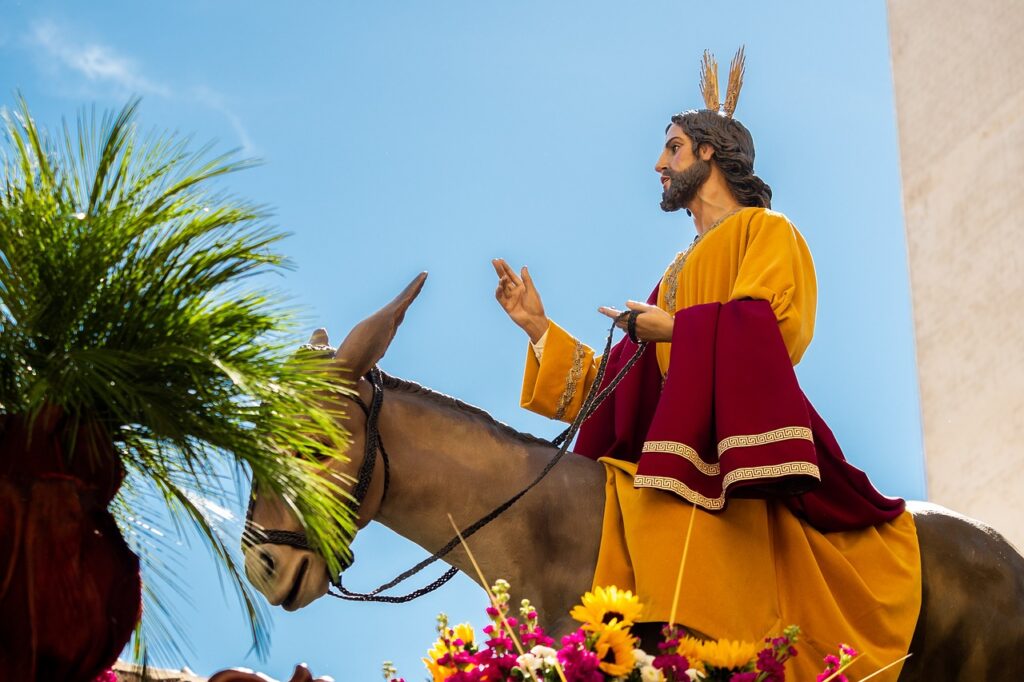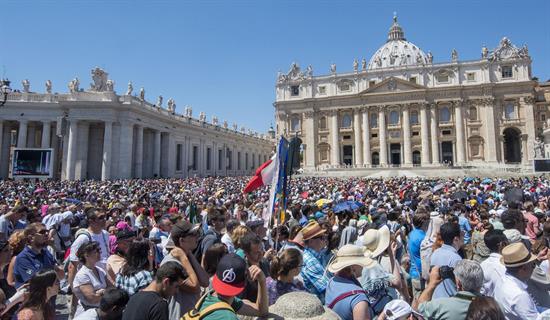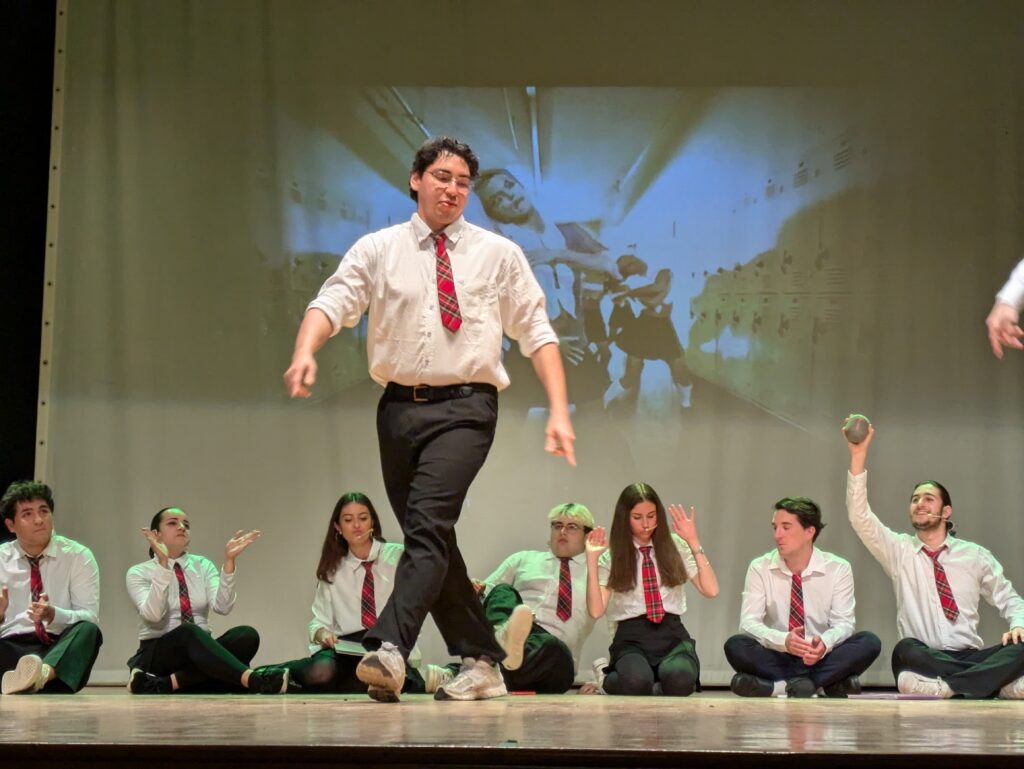Reflection by Bishop Enrique Díaz: On a Donkey
Palm Sunday

Bishop Enrique Díaz Díaz shares with Exaudi readers his reflection on the Gospel of this Sunday, April 13, 2025, entitled: “On a Donkey.”
***
Isaiah 50:4-7: “I have not turned my face from insults, and I know that I will not be ashamed”
Psalm 21: “My God, why have you forsaken me?”
Philippians 2:6-11: “Christ humbled himself, therefore God exalted him”
The Passion of Our Lord Jesus according to Saint Luke 22:14-23:56
If we imagine the events that took place in Jesus’s time, we will discover a great contradiction: great figures are not acclaimed by the mob, nor do they ride on donkeys; They do not walk unprotected nor allow themselves to be touched. Jesus is a king who responds to the expectations of a poor, oppressed people, yet touches their most intimate fibers, their deepest questions. It might seem contradictory, but his entry into Jerusalem gives new meaning to the expectation of the Messiah. It is not about living for and by power; it is not about seeking happiness in riches; it is not about seeking satisfaction in pleasures. Jesus, with his gestures and his proposals, offers another happiness and a very different vision of life. Today, as we “celebrate” Palm Sunday and approach Jesus, as one of those who acclaim him, what does he tell us and what does he leave in our hearts? A borrowed donkey, some cloaks scattered along the road, branches torn from the trees on the banks of the river—these are the emblems of this king. How should we follow him today? His actions seem like a reproach to the great figures of his time and to the powerful today; But they are also sincere expressions of what should be important: living simplicity and harmony in the heart, not on the outside. He is a Messiah who changes all perspectives and seeks true happiness of the heart. Even though he is called a teacher, Jesus does not present himself like other teachers who pontificate, judge, and condemn; rather, he presents himself as the shepherd who welcomes, listens, and accompanies.
Palm Sunday begins Holy Week. Our streets and our churches will be filled with palm branches and songs: “Long live Christ the King!” We want to accompany Jesus, we want to commemorate that first triumphant entry into Jerusalem. Triumphal? As simple as it may seem, we can call it triumphant, but it is an entry far from triumphalism, far from the power that crushes. Poor Jesus rides on a donkey, not meant to impress anyone. And perhaps that is why, because he does not want to impress, but because he wants to reveal himself as a simple and humble Messiah; he does not want to oppress, but rather he wants to give his life; He does not want to enslave, but rather to liberate. How different from other leaders who enter our communities! How different from our ambitions and our selfishness! Jesus’ manifestation on this day will be a serious rebuke to a world organized for and by the economy and profit; it is a denunciation of a false world that, setting aside the dignity of persons, rises to new powers and new structures; a society that, forgetting the needs of those who suffer, flaunts riches and luxuries. Palm Sunday is a call to respect the dignity and rights of the person as such, not as they produce or possess.
Many have sought to silence Christ in our times. We turn a deaf ear and do not want to hear his words. We are irritated by his insistence on the dignity and worth of each person as children of God. But today, as then, Christ proclaims his word with truth and courage. When the Pharisees rebuke Jesus to silence his disciples, his response is forceful: “I tell you the truth, if they keep silent, the stones will cry out.” Jesus does not enter Jerusalem as a conqueror, but he does have a proposal to make to all those gathered there. He does not want to conquer by force of arms, but offers a different kingdom from the simplicity of a donkey, from the enthusiastic cries of the crowd, and with the words of a different teaching. Jesus was not mute then, nor can he be in our days. He does not want to remain silent in the face of injustice or attacks on life. He raises his voice for all who suffer. Jesus cannot go unnoticed in our world, as if he were merely a voice that has nothing to say in this environment of injustice and corruption. We cannot and should not imagine a Jesus who is subdued, who does not seduce, who does not call, who does not touch hearts. Today, Jesus places himself at the center of communities in order to manifest his word. Jesus takes refuge in the hearts of the simple, from where he speaks his truth. Will we be able to listen to him?
As we look to Jesus today, we must renew our efforts to learn to think, feel, love, and live like Jesus. This is what should be in the hearts of every believer this Holy Week. It is true that it begins with the celebration of a very special triumphal entry, but later, beginning with the proclamation of the Gospel on this day, it is manifested in the complete surrender of love and compassion for all people. Holy Week is the manifestation of Jesus’ mercy. His gift, his cross, death, and resurrection will be the cry for life in a culture of death. Today, let us accompany Jesus with shouts of joy and hosannas, but throughout the week, let us accompany him in his passion, death, and resurrection. We are his disciples. Let us live this week with Jesus!
God, full of love and goodness, who have chosen to give us Christ, our Savior, made man and nailed to a cross, as an example of humility, grant us to live according to the teachings of his passion, so that we may share with him in his glorious resurrection. Amen.
Related

“I Will Never Be Herod for the Innocents”
Wlodzimierz Redzioch
14 April, 2025
6 min

I have ardently desired to eat this Passover with you: Fr. Jorge Miró
Jorge Miró
12 April, 2025
2 min

Pope Francis Sends a Message of Hope to the Young People of the UNIV 2025 International Congress
Exaudi Staff
11 April, 2025
5 min

“Highway to Heaven” Arrives in Rome: Carlo Acutis’ Musical Evangelizes with Art and Heart
Exaudi Staff
09 April, 2025
2 min
 (EN)
(EN)
 (ES)
(ES)
 (IT)
(IT)

